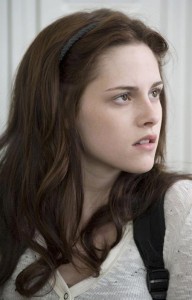Twilight vs Harry Potter: Leaving Space
This was recently posted on the website Learn from my Fail:
"I got into an argument with this at school. She was of the opinion that Twilight was better than Harry Potter. Her reasoning? Harry Potter's characters had too much personality, while Twilight's characters were blank and boring enough that she could put herself in their places."

Space available?
Now, before you say anything snarky, consider this, from best-selling (and in my opinion, genius) writer Elmore Leonard. In his ten rules for writing, number eight is:
"Avoid detailed descriptions of characters, which Steinbeck covered. In Ernest Hemingway's 'Hills Like White Elephants', what do the 'American and the girl with him' look like? 'She had taken off her hat and put it on the table.' That's the only reference to a physical description in the story."
Now, my question is, are we dealing with the same thing?
Because really, the Twilight reader has a valid point, and probably one of the best explanations for Stephanie Meyer's success despite the critical drubbing she's taken from the literary establishment. Her characters are so basic, so lacking in the details of what we normally consider personality, that it probably is easy to insert your own personality in their place. Writing classes and most professional writers would call this "bad," but is it something from which the rest of us ostensibly "good" writers could benefit?

Excessive complexity?
I confess, allowing readers to insert their own personalities into my characters is not a priority in my writing. I try to make my characters believable, understandable, and interesting; if I get that right, I assume readers will be able to both sympathize and empathize, which are similar but not quite the same thing as inserting yourself into the story. If anything, I (and scads of other writers, all less successful than Stephanie Meyer) try to make our characters as detailed as possible, if not physically than certainly psychologically. One of my favorite writing comments, by director/screenwriter David Koepp, is (and I'm paraphrasing) that the more specific we make a character, the easier it is for the reader/viewer to see the universal aspects of it.
So are we going about this all wrong? Are we not leaving enough space for the reader?
I don't think so, but then again, I wouldn't, would I? What do you think?



